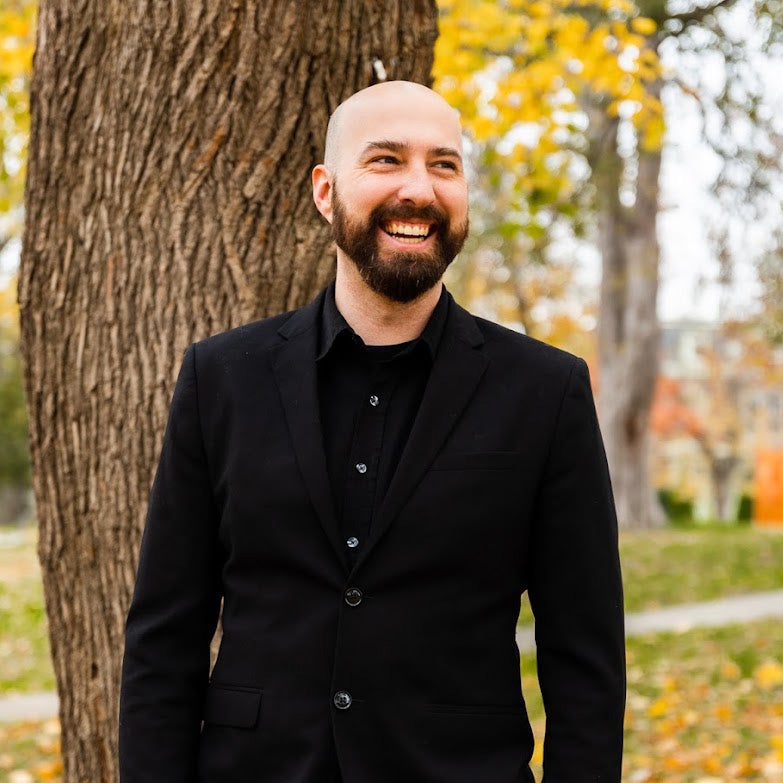Chasing the Mystery — Dr. Maxwell Kennel (BA 2013, MTS 2015)

When Maxwell Kennel (BA 2013, MTS 2015) purchased a $3.00 paperback copy of Mennonites and Classical Theology by A. James Reimer from the New Hamburg MCC thrift store, he never would have guessed that more than a decade later, equipped with a master's and doctoral degree, he would bring that same book back into print as director of Pandora Press, an independent Mennonite publishing company. “It was really a dream come true,” Max shared.
Before becoming director of Pandora Press, Max eagerly pursued higher education. He completed an Arts degree in Philosophy and English at UWaterloo in 2013, graduated from Grebel’s Master of Theological Studies (MTS) program in 2015, and went on to complete a PhD in Religious Studies at McMaster University, successfully defending his dissertation in 2021.
Midway through 2021, while working as a Social Sciences Humanities Research Council (SSHRC) Postdoctoral Fellow at the University of Toronto, Max received a call from Christian Snyder, the director of Pandora Press at the time. “He invited me to start taking the company in new directions,” and after accepting the offer, Max has done exactly that. “Since then, I’ve tried to further and transform its legacy by bringing the full backlist back into print, updating the website, putting out a new catalogue, and commissioning a new logo.”
Today, Max is involved in a number of activities extending beyond Pandora Press. He and his partner Amy live in Thunder Bay, where Max works at the Centre for Social Accountability at the Northern Ontario School of Medicine University. There, Max is primarily involved in “researching social accountability and writing on socially accountable approaches to research.” He also teaches occasionally in the Faculty of Education at Lakehead University and recently instructed a graduate course on education, research, and social change. Max summarizes his workweek as spent “writing and teaching, meeting with researchers and practitioners, and collaborating with an interdisciplinary team of doctors and educators.”
In his work at Pandora Press, Max finds fulfillment in meeting with authors and helping them to refine and bring their projects to fruition. Max’s desire to work in editing and publishing existed before he joined Pandora Press. He added, “During my MTS degree at Grebel, I discovered an unpublished manuscript from the 1960s by Robert Friedmann. The manuscript was called Design for Living, and it articulated Anabaptist values through the language and literature of secular humanism and existentialism. So, I edited the manuscript in the year between my MTS and PhD and published it with Wipf and Stock in 2017.” Max unearthed a buried voice and revived it, giving him a sense of fulfilment because he “was able to make something public that would have otherwise been lost.”
Max lived at Grebel during his first year studying at the University of Waterloo and remembers his stay as an important time of questioning in his life. “I chose to come to Grebel because I wanted to live in an environment where I could talk about the things that were important to me—religion, politics, culture, the tensions of Mennonite identity—and I found a great group of people there who were interested in similar things,” reflected Max. While living at Grebel, Max dug deep into philosophy and pursued academic excellence.
After finishing his undergraduate degree at Waterloo, Max returned to Grebel as a student in the MTS program. Graduate studies at Grebel connected Max with a group of scholars and thinkers who remain a significant part of his professional life in publishing and research. “In the MTS program and during my PhD, I loved feeling like I was a part of a legacy of Mennonite theological and philosophical reflection. The sense that I was a part of a history and a tradition that was transforming in the present was an essential part of my time at Grebel and it has left an indelible mark on my present identity and values.”
Max met Distinguished Professor Emeritus James Reimer, the author Mennonites and Classical Theology, at a Grebel community supper in 2010. “I was thrilled to meet A. James Reimer shortly before his passing, and it was very meaningful to me when he read some of my undergraduate writing,” Max recalled. “I remember telling him that I had bought his book,” and in 2021, when Max reprinted the book, he felt it was “a full-circle movement of meaning.”
Meaningful interactions with peers and the wider Grebel community—like meeting James Reimer—became some of Max’s most impactful experiences at Grebel. He reflected on the importance of these encounters in his message to current students: “The world is a great mystery, and my encouragement would be to take care and pay attention to precisely how the conversations you are part of can both demystify the things that can be known, and deepen the richness of the mystery of what we cannot fully know.” In late-night philosophy chats, hours of studying, and the purchase of a $3.00 book, Max took on the age-old task of philosophical and theological exploration and dove into the deep waters of the unknown.
Max's story is part of Grebel's 60 Stories for 60 Years project. Check out our 60 Stories page for more articles in this series. If you would like to nominate a Grebel alumnus to share about their experiences at Grebel, please submit a nomination form.
By Tim Saari
Max lives in Thunder Bay, Ontario with his partner Amy and their two dogs. Since 2021, Max has worked as director of Pandora Press. He is also a Senior Research Associate at the Centre for Social Accountability at NOSM University. Max is working on a trilogy of books on social critique including Postsecular History (Palgrave Macmillan, 2022), Ontologies of Violence (Brill, 2023), and Critique of Conspiracism (Routledge, under contract). In his spare time, Max enjoys a good cup of coffee with an interesting book, walking his dogs in the forest, and getting out on the water during the sailboat racing season.